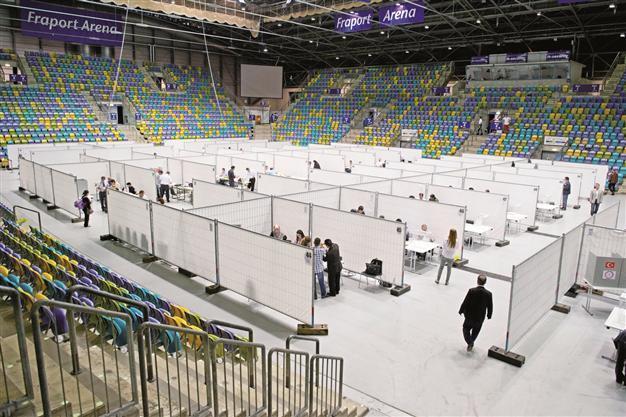A week to go in polls: AKP celebrating early victory
Serkan Demirtaş ANKARA

Election workers prepare polling booths at the Fraport Arena sports hall in Frankfurt am Main, western Germany. AFP Photo
With just a week left until the presidential polls, the three candidates and political parties supporting them seem to be intensifying their election campaigns, although Prime Minister Recep Tayyip Erdoğan is leading the public opinion polls for a comfortable victory, even in the first round.Turkey’s 12th president will be elected on Aug. 10 through a direct vote, as Erdoğan and his two rivals, Professor Ekmeleddin İhsanoğlu and Selahattin Demirtaş, are in a tough battle for the country’s most prestigious position.
Already confident that Erdoğan will win elections in the first round, the Justice and Development Party (AKP) headquarters has begun celebrations of their early victory and deliberations for the post-Erdoğan era. The public opinion polls conducted by the AKP and some other institutions indicate that Erdoğan will have a minimum of 52 percent of the votes in the first round and that the figure could go as high as 56 percent in accordance with the percentage of the turnout.
There is speculation that Erdoğan’s team has already begun writing the “balcony speech” he will make late Aug. 10 after the announcement of his victory, just like he has done in the aftermath of all of his election wins. That shows the party is not thinking of Aug. 10, but Aug. 11, the day when the AKP will officially start a new process to determine the new chairman and therefore the new prime minister.
Right after the elections, the AKP’s Central Decision-making Council (MKYK) is set to convene under Erdoğan’s leadership for the last time in which he would introduce his resignation from the party in line with constitutional obligations. At the same council meeting, the deputy leader of the AKP, Mehmet Ali Şahin, is expected to be nominated as the acting chairman to take the party to the General Convention within 45 days to elect the new leader.
Under current conditions, it would not be an exaggeration to argue the AKP has won the presidential elections in their minds, as they continue the process in self-confidence.
CHP-MHP coalition less enthusiastic
Differently from the AKP, two opposition parties, the Republican People’s Party (CHP) and the Nationalist Movement Party (MHP), are seemingly less enthusiastic compared to the previous months in their joint bid to elect İhsanoğlu as president. Public opinion polls indicate İhsanoğlu will receive less than 40 percent of the votes, even less than the sum of the two parties’ total votes.
The cracks within the CHP over İhsanoğlu’s nomination are still creating an obstacle in front of effective support from the social democratic party to their candidate. The current picture suggests İhsanoğlu is solely CHP leader Kemal Kılıçdaroğlu’s presidential candidate and not the party’s institutional nominee. Except for Kılıçdaroğlu, no prominent CHP officials are actively taking part in the pre-election campaign, leaving the party’s institutional support weak. It seems these officials want to leave Kılıçdaroğlu alone in accounting for İhsanoğlu’s potential loss, which could be translated as preparation for an early defeat.
The MHP, however, is continuing its low-profile backing of İhsanoğlu. MHP leader Devlet Bahçeli is almost non-existent, except for some public rallies and his party officials refrain from giving the impression that they are allying with the CHP.
Demirtaş building image
Demirtaş is eagerly carrying out his presidential campaign, holding public rallies both in the western and eastern parts of Turkey in his bid to remove their “ethnic party” tag. Public opinion polls show Demirtaş will win around 9 percent of votes, nearly two percentage points more than his Peoples’ Democratic Party (HDP). Demirtaş’s performance in the presidential elections will strengthen the party’s hand in the ongoing Kurdish peace process and solidify his position in the Kurdish political movement.
















